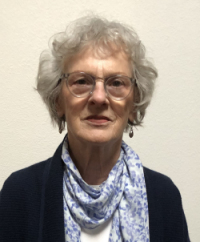

When I was diagnosed with DCIS breast cancer in 2001, I considered my options for treatment and chose the most extreme one: bilateral mastectomy. That choice meant that I could avoid chemo and radiation. I had some thought that my choice was excessive, but my reasoning was to rid my body of cancer and complications. Therefore, I would not be “looking over my shoulder” for symptoms, always wondering; I could say good-bye to cancer. Of course, in those years there was no genetic testing; so I had no idea I was BRCA 2.
And so it was that in 2016 the first symptom of lower abdominal discomfort began. I got a referral for my gynecologist who did a pelvic exam and also ordered a transvaginal ultrasound. Results came back “no significant abnormality.” (Only after my diagnosis a year later when I asked to see the radiologist’s report, did I find out that my ovaries were hidden from view.) Although my urine tests were normal, I asked to see a urologist. When I talked about a specific pain on my left side, she suggested that it might be caused by diverticulitis. My keyword search on Google did not agree.
Months went by while I tried elimination of certain foods, one by one. After going dairy-free for two months, I commented to my PCP that, after losing ten pounds, I was “skinny everywhere except my belly.” He decided it was time for a CT scan. When I went on the web after the diagnosis, it was disappointing to me that I had expressed all the markers of ovarian cancer and that the four medical professionals I had seen during the year were unaware of them. With my anger and disappointment, it has been a struggle for me to forgive.
The educated guess was that my cancer was stage IIIB. It’s a guess because knowing the cancer cells had been growing for over a year, I chose the option of doing some chemo first, then surgery, and then the remainder of the chemo treatments. I benefited from a homeopathic surgery protocol and gemmotherapy during treatment. All went well.
It was encouraging to see the smiles on my oncologist’s face at each of the three-month monitoring check-ups. Shortly after my first year of remission, however, that old familiar first symptom of lower abdominal heaviness returned. Although my uterine lining seemed free of cancer cells, my doctor listened to me when I proclaimed that there was something wrong. With an elevated CA125, a CT scan was ordered and two nodules were seen in the lower pelvic area. The radiologist called it “suspicious”; my oncologist called it a “recurrence.”
Back into treatments! But this time it was “light chemo.” When my numbers were stubborn with only Carboplatin, he added Avastin, and the CA125 fell quickly. That is why, now that I am back in remission (yay!) I continue to have Avastin infusions. It seems I am one of those people for whom cancer is considered chronic with ongoing need for treatment. One survivor relayed that her oncologist had said, “You will not die of cancer, but you will die with cancer.”
It has been said numerous times, but I repeat, “You must be your own advocate.” My PCP did not know the symptoms of ovarian cancer. After this experience, one of my aims is to educate. And so I took the informative and well-designed posters from the Ovarian Alliance of Oregon and SW Washington to the office of the gynecologist and my PCP. I continue to keep a supply of the bookmarks in the waiting room of the PCP. “Knowledge is Power.” Women are often unaware that a PAP smear tests only for cervical cancer.
My immediate family has been grateful for genetic testing. They consider it a gift to have that knowledge and awareness. I was disappointed but not surprised that my siblings (all over eighty years of age) were uninterested and did not seem to understand the importance of genetic testing for their children and grandchildren.
During my treatments I experienced the strong support of family, friends, and my church community. I felt and was encouraged by the many prayers and hugs. Endorphins do wonders for body and soul! My husband was a rock and greatly appreciated. (Recently a friend told me he could gauge how well I was doing by looking at my husband!). Our daughters gifted me with phoning and Face-timing more frequently – and still do. I was also – and continue to be – so very grateful for the medical team which has guided me through this journey and for a doctor who is knowledgeable, professional, caring, and personable. They understand how vulnerable patients and their loved ones feel.
Yes, I have been grateful for the many blessings in my life. At the same time, being diagnosed with a “silent killer” is news not easily dismissed. Particularly when I was diagnosed, I reflected on the meaningful life I’ve had. I found a beautiful calligraphy of Ps 118:24 (which hangs above my kitchen sink): “This is the day which the Lord has made; let us rejoice and be glad in it.” Years ago a friend of ours who had a terminal illness responded to those who say, “Have a good day!” by replying, “In my situation, every day is a good day!”
The future? I know I’ll be dealing with cancer for the rest of my life. Is there a new and special purpose for me in these additional years that have been gifted to me?
